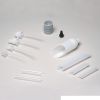Geotech Poly Disposable Bailers
Features
- Manufactured under strict clean-room conditions, with FDA approved high density poly resin or FEP
- Orbit Flux design fills 33% faster and V-notch design provides for accurate pouring
- As heavy as most double-weighted bailers without the cost
- Expedited repair and warranty service
- Lifetime technical support
- More
Overview
The Geotech disposable bailers come in a variety of configurations and specifications for every type of water sampling requirement, including the most demanding.
Design
Geotech's Orbit Flux design fills 33% faster than other bailers. V-notch design for trouble-free cord attachment and accurate pouring. As heavy as most double-weighted without the extra cost.
Manufacturing
Made of virgin, FDA-approved, high-density poly resin. The polyethylene used contains no plasticizers or additives, and no regrinds are accepted. Geotech polyethylene bailers go through independent laboratory testing and analysis on each material lot.
Model Options
- Optional double check valve: Isolates the sample, sealing as the bailer is removed from the well at specific depths.
- Pressurized disposable bailer available: Special bailer provides the convenience of using in-line dispos-a-filters in the field when pumps are not available.
In The News
Spring 2025 Environmental Monitor Available Now
In the Spring 2025 edition of the Environmental Monitor, we highlight partnerships across the world and the importance of collaboration between government agencies, universities, environmental groups, local communities, and other stakeholders. From great white shark research in Cape Cod to monitoring fisheries in Lake Erie, this latest edition underscores partnerships that connect stakeholders in a watershed through environmental data. With an emphasis on data sharing, a combination of real-time and discrete sampling keeps the public and partners informed of environmental conditions. Our writers also sought out science professionals dedicated to working with peers within and outside of the environmental sector.
Read MoreMonitoring Mariculture in the Gulf of Alaska
The mariculture industry in the Gulf of Alaska has been steadily growing in recent years, guided by ongoing research to help refine farm location and cultivation practices. A subset of aquaculture, mariculture focuses on rearing organisms in the open ocean. In Alaska, finfish farming is illegal, so most farms cultivate kelp, oysters, or a combination of the two. These small, locally operated farms started popping up in the Gulf of Alaska in the early 1990s, when shellfish farming first became legal. Kelp farming did not begin to catch on in the state until 2016. Many of the coastal areas that have grown interested in mariculture are historically commercial fishing communities.
Read MoreSupplying Seattle’s Drinking Water: Using Data Buoys to Monitor the Cedar River Municipal Watershed
Providing clean, safe, and reliable drinking water for the 1.6 million people in the greater Seattle area is a top priority for Seattle Public Utilities (SPU). With limited water supplies, SPU dedicates considerable resources to maintain its watersheds and mountain reservoirs. About 70 percent of Seattle Water comes from the Cedar River Municipal Watershed , and the other 30 percent comes from the South Fork Tolt River Watershed . [caption id="attachment_39574" align="alignnone" width="940"] Data buoy in Chester Morse Lake . (Credit: Kevin Johnson / Seattle Public Utilities) [/caption] Jamie Thompson, a fisheries biologist at SPU, monitors aquatic ecosystems centered on fish listed under the U.S. Endangered Species Act (ESA).
Read More


































